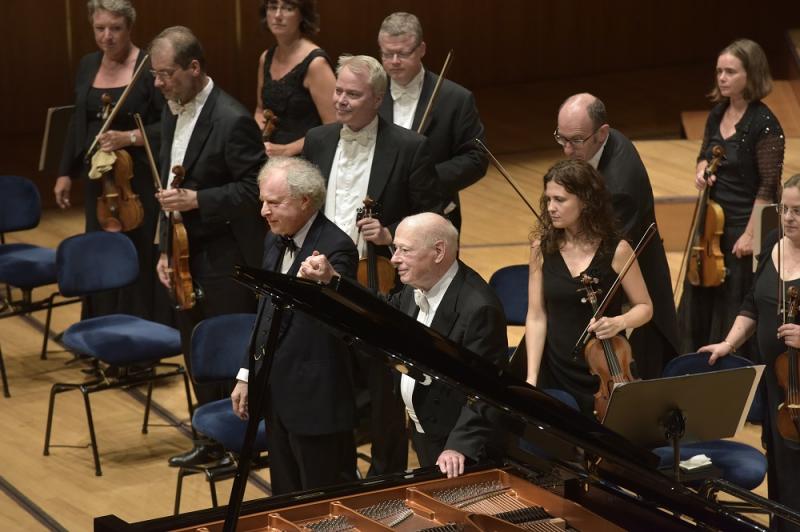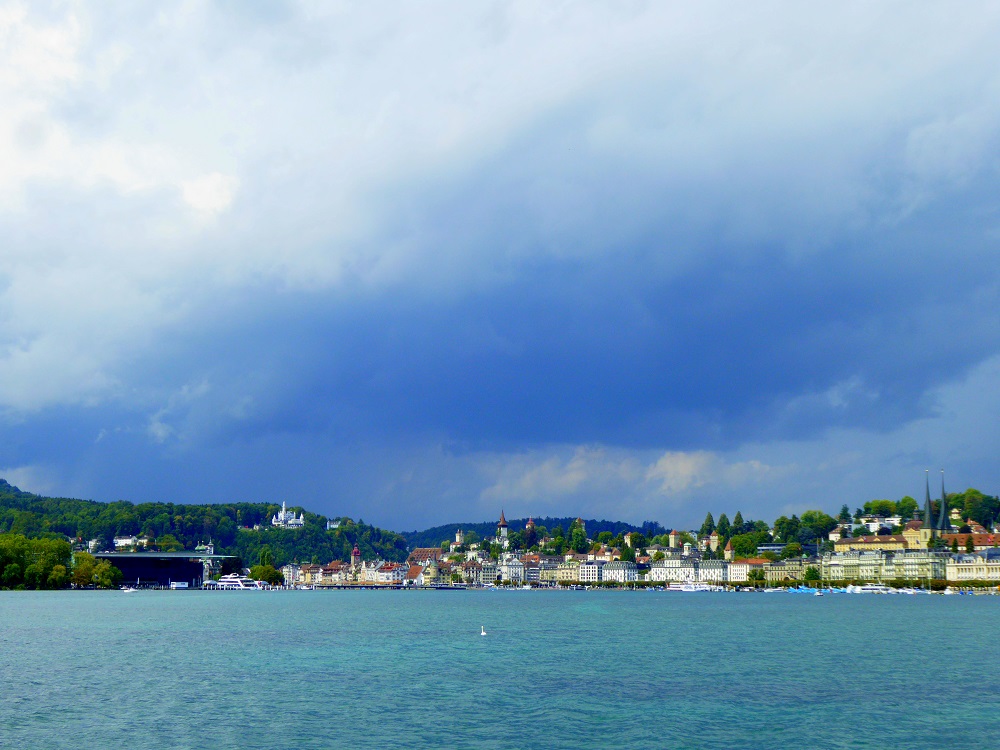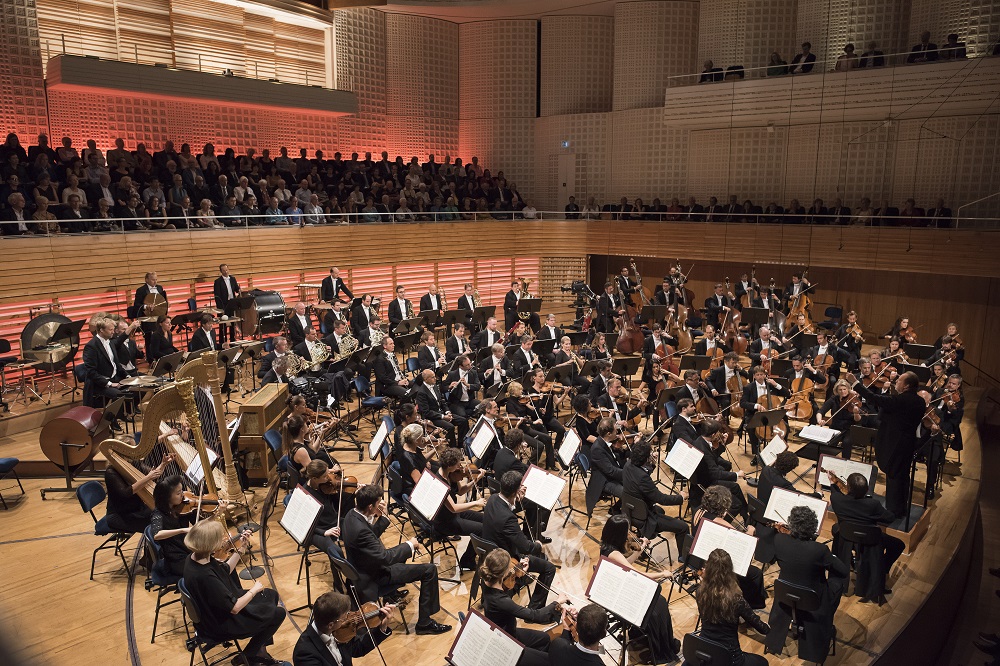theartsdesk at the Lucerne Festival - all-Beethoven and all-Ravel concerts from the greatest | reviews, news & interviews
theartsdesk at the Lucerne Festival - all-Beethoven and all-Ravel concerts from the greatest
theartsdesk at the Lucerne Festival - all-Beethoven and all-Ravel concerts from the greatest
Haitink conducts an unearthly 'Pastoral' while Chailly ignites symphonic dances

Like the Proms, but over a more concentrated time-span, in a much better concert hall and with a swankier audience paying a good deal more, the Lucerne Festival offers a summer parade of the world's greatest orchestras and conductors night after night.
So it was that I struck gold, as I did at the Easter Festival, in two evening concerts and another unique offering on a Saturday morning, Matthias Pintscher conducting the young players of the Lucerne Festival Academy in seven recent pieces by composers on the theme of the creation in Genesis. In between, I also managed to fulfil a long-desired objective to visit Rachmaninov's extraordinary Bauhaus-inspired Villa Senar - his commission - over Lake Lucerne near Weggis; inspection is by appointment only, but it can't be long before the place achieves proper house-museum status. 
As always, Haitink's gestures are minimal but clear; the baton hand shapes economically, but even in the most legato phrases, you can observe tension of the right sort in the quivering fingers of the left hand. Every tempo of this "Pastoral" seemed exactly right - flowing, ethereal, only touching the ground in a handful of properly foot-stamping rustic dances which he more or less left to the energetic propulsion of his top players underpinned by the vibrant double-basses (leader the sensational Enno Senft).  No living conductor can offer more intense pianissimos; dynamic levels preserved the intimacy of Beethoven's most lovable symphony and the long crescendos of the first-movement development were all the more revelatory. There are levels of interior dialogue which just keep giving - in the ineffably flowing "Scene by the Brook," for instance, where the strings withdrew even more miraculously before the brief drama of sudden minor-key sadness and the superlative birdsong cadenzas of flautist Herman Van Kogelenberg, oboist Kai Frömbgen and clarinettist Richard Hosford. As for the "Shepherd's Hymn of Thanksgiving", no-one can unfold it more naturally than Haitink, or make a better case for what in other performances can seem like an over-extended meditation; from one ecstatic string tremolo to the next was an object-lesson in Haitink's long view.
No living conductor can offer more intense pianissimos; dynamic levels preserved the intimacy of Beethoven's most lovable symphony and the long crescendos of the first-movement development were all the more revelatory. There are levels of interior dialogue which just keep giving - in the ineffably flowing "Scene by the Brook," for instance, where the strings withdrew even more miraculously before the brief drama of sudden minor-key sadness and the superlative birdsong cadenzas of flautist Herman Van Kogelenberg, oboist Kai Frömbgen and clarinettist Richard Hosford. As for the "Shepherd's Hymn of Thanksgiving", no-one can unfold it more naturally than Haitink, or make a better case for what in other performances can seem like an over-extended meditation; from one ecstatic string tremolo to the next was an object-lesson in Haitink's long view.
Over-exposure to the Leonora No. 3 Overture always makes its predecessor's excursions startling; here they came across with absolute rightness, convincing for the duration. And there was aristocratic playfulness from András Schiff in the First Piano Concerto - a neat continuity with his Easter Festival concert of all C minor in the emergence into a sunny C major (an alternative note suggesting the minor in the first movement could only have been wryly deliberate).  Seeing Schiff in the audience for the second half, I wondered if he felt about this "Pastoral" as I did, so the next morning I put in a request for a comment. It was typically gracious and sincere, a perfect homage from one great artist to another: "The performance of the 'Pastoral' Symphony was excellent and profoundly moving. In an age of conductors with gigantic egos it's very important to listen to Bernard Haitink who is a shining example of integrity and modesty, always respecting and serving the composer. The relationship between him and the COE is very special indeed, it's based on mutual respect and love. The Sixth Symphony does not fit into the cliché of heroic Beethoven. Tenderness, lyricism and quality of sound in the soft and softest dynamics are needed for the right interpretation and this is what we experienced last night."
Seeing Schiff in the audience for the second half, I wondered if he felt about this "Pastoral" as I did, so the next morning I put in a request for a comment. It was typically gracious and sincere, a perfect homage from one great artist to another: "The performance of the 'Pastoral' Symphony was excellent and profoundly moving. In an age of conductors with gigantic egos it's very important to listen to Bernard Haitink who is a shining example of integrity and modesty, always respecting and serving the composer. The relationship between him and the COE is very special indeed, it's based on mutual respect and love. The Sixth Symphony does not fit into the cliché of heroic Beethoven. Tenderness, lyricism and quality of sound in the soft and softest dynamics are needed for the right interpretation and this is what we experienced last night."
What we experienced the following night from the Lucerne Festival Orchestra under Abbado's successor, Riccardo Chailly, was quality of sound in the louder dynamics, not always the necessary tenderness and lyricism needed for introspective Ravel. It was, essentially, a concert of two halves, the first less successful. A fine idea, certainly, to run straight from the melancholy coda of the Valses nobles et sentimentales into the murk that eventually explodes into the expressionist nightmare of La Valse. But there was insufficient inscaping of the Valses' dark undertow, and less delirium in the later stages of the big "choreographic poem" than I'd heard from Paavo Järvi and an Estonian Festival Orchestra on fire in Pärnu a few weeks earlier (now there's a team that's carrying on the essence of what Daniel Harding described to me as the Abbado-LFO "love-in" under an inspirational conductor).  The concert had originally been planned with a Debussy first half and the complete Ravel Daphnis et Chloé in the second (last three Lucerne Festival images by Priska Ketterer). The suites are no substitute for the whole thing, especially if they do without the wordless chorus that intensifies mystery and ecstasy. But it's fascinating to hear the wind take their part in the First Suite's build-up to the pirates' romp, which finally sent this concert rocketing for the first time - the final orgy furnishing the second thrill - as earthy-brilliant brass brandished silver swords. And it was wise to play to a special asset of the LFO, long-serving principal flautist Jacques Zoon, finding all the magic in perhaps the most seductive solo for the instrument in the entire orchestral repetoire, the "Pantomime".
The concert had originally been planned with a Debussy first half and the complete Ravel Daphnis et Chloé in the second (last three Lucerne Festival images by Priska Ketterer). The suites are no substitute for the whole thing, especially if they do without the wordless chorus that intensifies mystery and ecstasy. But it's fascinating to hear the wind take their part in the First Suite's build-up to the pirates' romp, which finally sent this concert rocketing for the first time - the final orgy furnishing the second thrill - as earthy-brilliant brass brandished silver swords. And it was wise to play to a special asset of the LFO, long-serving principal flautist Jacques Zoon, finding all the magic in perhaps the most seductive solo for the instrument in the entire orchestral repetoire, the "Pantomime".
Zoon's supreme sophistication was only the first of many in a Boléro which I had a hunch would have the usual nay-sayers exclaiming that they had no idea it could be so good. Well, it's one of the glories of orchestral possibilities if done well, and this, like Haitink's "Pastoral", was a total triumph. While in Ludovic Morlot's performance with the City of Birmingham Symphony Orchestra at the Proms earlier this August, the trombonist was the most nuanced star, all the key players here wrought their special magic; and the full, brilliant, climax with its heart-leaping modulation could not have been more exciting.  We were back to the inchoate beginnings adumbrated in La Valse the following morning in the smaller hall - more a studio - of the KKL complex. The seven "Genesis" pieces, originally commissioned for the 40th anniversary of Ensemble Intercontemporain, form a fascinating whole (alas, I had to rush to catch my train back to Zurich Airport after the fourth day of Creation, so I still haven't heard them all). Chaya Czernowin's On the Face of the Deep and Franck Bedrossian's Vayehi erev vayehi boker ("And it was evening and it was morning") homed in on unearthly primeval sounds, with Pintscher as conductor establishing the ideal line connecting them, while Marko Nikodijević's dies secundus showcased racy rhythms.
We were back to the inchoate beginnings adumbrated in La Valse the following morning in the smaller hall - more a studio - of the KKL complex. The seven "Genesis" pieces, originally commissioned for the 40th anniversary of Ensemble Intercontemporain, form a fascinating whole (alas, I had to rush to catch my train back to Zurich Airport after the fourth day of Creation, so I still haven't heard them all). Chaya Czernowin's On the Face of the Deep and Franck Bedrossian's Vayehi erev vayehi boker ("And it was evening and it was morning") homed in on unearthly primeval sounds, with Pintscher as conductor establishing the ideal line connecting them, while Marko Nikodijević's dies secundus showcased racy rhythms.
Though I didn't get to hear the last three pieces, it would appear that the much known and admired Anna Thovaldsdottir/Þorvaldsdóttir's Illumine was the still yet always evolving heart of the sequence, discarding the wind and brass effects of the previous pieces in describing a single arc of string sound, elucidating a final triad very movingly. There would be more back-to-the-beginnings on the following day properly exploring the festival theme of "Childhood" - less nebulous than some of its previous catch-alls - and I'd like to have heard them. But at least I'd had my vision.
Explore topics
Share this article
Add comment
The future of Arts Journalism
You can stop theartsdesk.com closing!
We urgently need financing to survive. Our fundraising drive has thus far raised £49,000 but we need to reach £100,000 or we will be forced to close. Please contribute here: https://gofund.me/c3f6033d
And if you can forward this information to anyone who might assist, we’d be grateful.

Subscribe to theartsdesk.com
Thank you for continuing to read our work on theartsdesk.com. For unlimited access to every article in its entirety, including our archive of more than 15,000 pieces, we're asking for £5 per month or £40 per year. We feel it's a very good deal, and hope you do too.
To take a subscription now simply click here.
And if you're looking for that extra gift for a friend or family member, why not treat them to a theartsdesk.com gift subscription?
more Classical music
 Kilsby, Parkes, Sinfonia of London, Wilson, Barbican review - string things zing and sing in expert hands
British masterpieces for strings plus other-worldly tenor and horn - and a muscular rarity
Kilsby, Parkes, Sinfonia of London, Wilson, Barbican review - string things zing and sing in expert hands
British masterpieces for strings plus other-worldly tenor and horn - and a muscular rarity
 From Historical to Hip-Hop, Classically Black Music Festival, Kings Place review - a cluster of impressive stars for the future
From quasi-Mozartian elegance to the gritty humour of a kitchen inspection
From Historical to Hip-Hop, Classically Black Music Festival, Kings Place review - a cluster of impressive stars for the future
From quasi-Mozartian elegance to the gritty humour of a kitchen inspection
 Shibe, LSO, Adès, Barbican review - gaudy and glorious new music alongside serene Sibelius
Adès’s passion makes persuasive case for the music he loves, both new and old
Shibe, LSO, Adès, Barbican review - gaudy and glorious new music alongside serene Sibelius
Adès’s passion makes persuasive case for the music he loves, both new and old
 Anja Mittermüller, Richard Fu, Wigmore Hall review - a glorious hall debut
The Austrian mezzo shines - at the age of 22
Anja Mittermüller, Richard Fu, Wigmore Hall review - a glorious hall debut
The Austrian mezzo shines - at the age of 22
 First Person: clarinettist Oliver Pashley on the new horizons of The Hermes Experiment's latest album
Compositions by members of this unusual quartet feature for the first time
First Person: clarinettist Oliver Pashley on the new horizons of The Hermes Experiment's latest album
Compositions by members of this unusual quartet feature for the first time
 Gesualdo Passione, Les Arts Florissants, Amala Dior Company, Barbican review - inspired collaboration excavates the music's humanity
At times it was like watching an anarchic religious procession
Gesualdo Passione, Les Arts Florissants, Amala Dior Company, Barbican review - inspired collaboration excavates the music's humanity
At times it was like watching an anarchic religious procession
 Classical CDs: Camels, concrete and cabaret
An influential American composer's 90th birthday box, plus British piano concertos and a father-and-son duo
Classical CDs: Camels, concrete and cabaret
An influential American composer's 90th birthday box, plus British piano concertos and a father-and-son duo
 Cockerham, Manchester Camerata, Sheen, Martin Harris Centre, Manchester review - re-enacting the dawn of modernism
Two UK premieres added to three miniatures from a seminal event of January 1914
Cockerham, Manchester Camerata, Sheen, Martin Harris Centre, Manchester review - re-enacting the dawn of modernism
Two UK premieres added to three miniatures from a seminal event of January 1914
 Kempf, Brno Philharmonic, Davies, Bridgewater Hall, Manchester review - European tradition meets American jazz
Bouncing Czechs enjoy their Gershwin and Brubeck alongside Janáček and Dvořák
Kempf, Brno Philharmonic, Davies, Bridgewater Hall, Manchester review - European tradition meets American jazz
Bouncing Czechs enjoy their Gershwin and Brubeck alongside Janáček and Dvořák
 Solomon, OAE, Butt, QEH review - daft Biblical whitewashing with great choruses
Even a top soprano and mezzo can’t make this Handel paean wholly convincing
Solomon, OAE, Butt, QEH review - daft Biblical whitewashing with great choruses
Even a top soprano and mezzo can’t make this Handel paean wholly convincing
 Two-Piano Gala, Kings Place review - shining constellations
London Piano Festival curators and illustrious friends entertain and enlighten
Two-Piano Gala, Kings Place review - shining constellations
London Piano Festival curators and illustrious friends entertain and enlighten
 Echo Vocal Ensemble, Latto, Union Chapel review - eclectic choral programme garlanded with dance
Beautiful singing at the heart of an imaginative and stylistically varied concert
Echo Vocal Ensemble, Latto, Union Chapel review - eclectic choral programme garlanded with dance
Beautiful singing at the heart of an imaginative and stylistically varied concert

Comments
What a brilliant, thoughtful